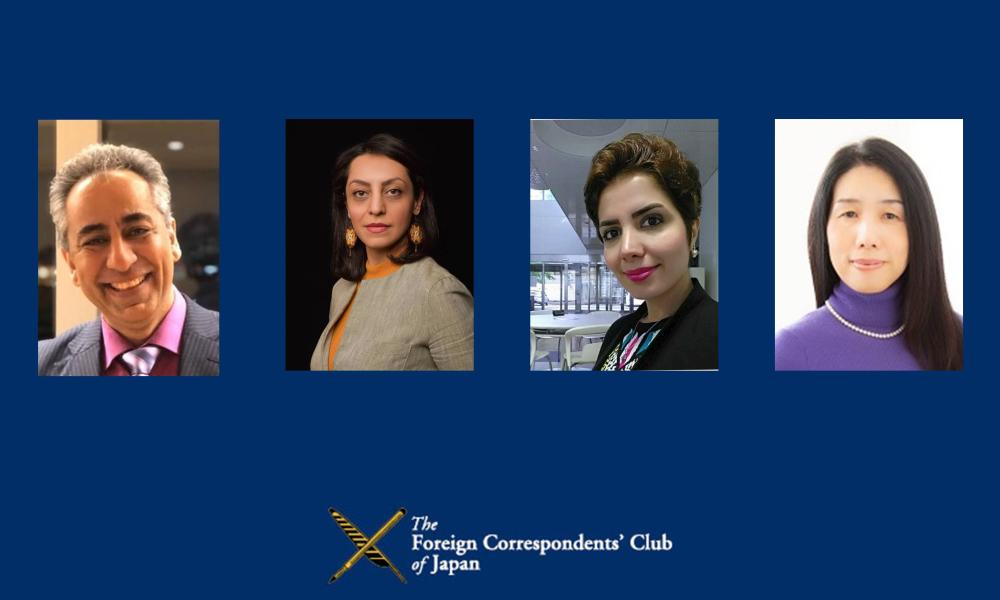PRESS CONFERENCE
Iran Protests: 'Woman, Life, Freedom' Explained
Sachi Sakanashi, The Institute of Energy Economics Japan
Serah Abri, Freelance Researcher
Somayyeh Mehri, International preschool teacher &
Mohammad Ali Bastami, English Instructor
11:00-12:00 Friday, December 16, 2022
(The speech and Q & A will be in English.)
Iran's months-long protest movement hit a new nadir this week with the execution of two 23-year-olds, Mohsen Shekari and Majidreza Rahnavard, for the crime of "waging war against God," or moharebeh. Human rights activists called it a "show trial without any due process."
Activist groups such as Iran Human Rights say that at least 500 people have been killed since the beginning of the protests on Sept. 16, with another 18,200 or so detained.
The Islamic Republic has a history of civil protests, but this year's unrest is somewhat unique as it involves many university students and others as young as 15 or 16. The movement started with the death under custody of Mahsa Amini, a young Iranian Kurdish woman who was detained for allegedly violating Iran's strict headscarf laws.
Many women and men across Iran have taken to the streets to protest, shouting the slogan, "Woman, Life, Freedom." Facing the largest challenge in decades, the Iranian regime is alleged to have recently abolished the morality police, which had taken Amini into custody.
The Iranian diaspora in Japan has been following events in their home country closely. They organized protests in Tokyo and other cities in support of the protesters. Yet they face an uphill battle not only against a regime determined to crush any dissent but also a multi-ethnic society with mainly Persian and Kurdish ethnic groups, as well as Azeri and Turkmen minorities, among others.
The direction the protests take will have ramifications for Japan, a U.S. ally, which still depends on oil imports from the Middle East and has bilateral investment ties with Iran despite the country's nuclear energy program.
Ms. Sachi Sakanashi holds an M.A. in International Relations from the University of Tokyo and is the Assistant Director of the Institute of Energy Economics at the Japanese Institute of Center Middle Eastern Economics. The fields of her research interest are contemporary Iranian politics, the energy industry of Iran, and Japan-Iran relations.
Ms. Sarah Abri is a freelance researcher and holds a PhD in medical social work. An expert on community outreach and social services, she completed her postdoctoral research at Tokyo Metropolitan University in 2021.
Ms. Somayyeh Mehri is currently working as an international preschool teacher in Tokyo. She holds an M.A. in English literature and language from Islamic Azad University in Tehran.
Mr. Mohammad Ali Bastami is an English instructor at a university in Tokyo and holds an M.A. in English literature from the University of Tehran.
How to attend:
Please register at front@fccj.or.jp with your name, the name of your media outlet, and FCCJ membership number. Due to space restrictions attendance will be limited. Doors open 15 minutes before the event. Please sign in, giving your name and contact details at the reception, and have your temperature taken before proceeding.
How to watch online: https://www.youtube.com/c/FCCJchannel/live
Livestreaming of the press events will be available and video of this event will be uploaded to our FCCJ YouTube channel.
How to ask questions: https://forms.gle/hoA81pATDPejkmcw9
Members watching the event online can submit questions for the speakers in advance using this submission form.
TV crew: Please make a reservation at front@fccj.or.jp. Doors open for TV crews only at 30 minutes before the event.
Professional Activities Committee


